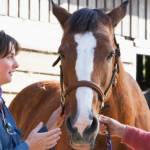Acupuncture in Horses: What’s the Point?

Acupuncture may seem strange to anyone raised in an atmosphere of so-called Western medicine with its emphasis on disease signs that can be easily seen or felt. Eastern medicine takes a wider view to encompass treatment modalities such as acupuncture. The idea of using needles to influence energy meridians within the body is more acceptable when horse owners observe their horses before and after an acupuncture treatment. Odd as it may look, acupuncture does relieve pain, anxiety, muscle soreness,and other sources of discomfort in horses. It can also be used to treat such widely divergent maladies as diarrhea, undescended testicles, contracted tendons, and laryngeal hemiplegia.
Practitioners admit acupuncture is not a magical cure-all. It will not instantly mend a broken bone or turn a lumbering draft horse into a speedy racetrack candidate. However, by using thin needles to stimulate various places (acupoints) on the horse’s body, this treatment can influence physiological effects. This may be due to release of hormones, activation of nerve responses, or triggering of immune system function.
An acupuncturist must work under the direction of a veterinarian in many states. Many veterinarians now have advanced training in acupuncture. After taking a health history and doing a physical examination, a practitioner will decide whether the horse’s problems can be helped by acupuncture. Then, depending on the particular horse and its condition, the acupuncturist will select the type of treatment to use and the acupoints that will work best. He or she might determine that adding electrostimulation to the inserted needles will strengthen the effect. Aquapuncture, where fluid is injected at the insertion points, or pneumoacupuncture, in which air is injected, are some other options.
Several treatments are often necessary to achieve the desired result. Like any type of veterinary treatment, individual horses respond differently, so what helps one horse may not work as well on another equine.
While acupuncture may not be the first treatment that occurs to the owner of a horse with a health problem, no one should give up on helping a horse without at least considering this therapy. If curing the horse is the goal, owners and veterinarians should keep an open mind about ways to reach this objective. The International Veterinary Acupuncture Society offers more information.








